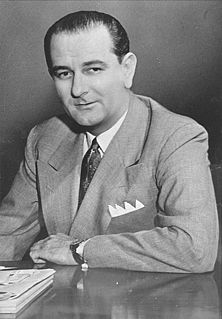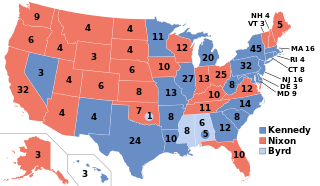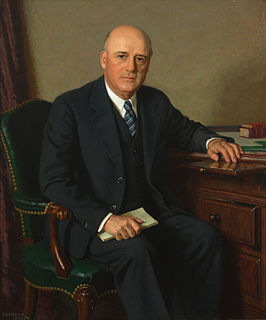
Lyndon Baines Johnson, often referred to as LBJ, was an American politician who served as the 36th president of the United States from 1963 to 1969. Formerly the 37th vice president of the United States from 1961 to 1963, he assumed the presidency following the assassination of President John F. Kennedy. A Democrat from Texas, Johnson also served as a United States Representative and as the Majority Leader in the United States Senate. Johnson is one of only four people who have served in all four federal elected positions.

Henry Barbosa González was a Democratic politician from the U.S. state of Texas, who represented Texas's 20th congressional district from 1961 to 1999.

The 1964 United States Senate elections coincided with the election of President Lyndon B. Johnson by an overwhelming majority, to a full term. His Democratic Party picked up a net two seats from the Republicans. As of 2019, this is the last time either party has had a two-thirds majority in the Senate, which would have hypothetically allowed the Senate Democrats to override a veto, convict and expel certain officials, or invoke cloture without any votes from Republicans. The Senate election coincided with Democratic gains in the House in the same year.

The 1960 United States Senate elections coincided with the election of John F. Kennedy as president. The Republicans gained one seat at the expense of the Democrats. The Democrats nonetheless retained a commanding lead in the Senate with 64 seats to 36. As Majority Leader Lyndon B. Johnson was elected Vice President, Mike Mansfield became the new Majority Leader.

The 1966 United States House of Representatives elections was an election for the United States House of Representatives in 1966 which occurred in the middle of President Lyndon B. Johnson's second term. As the Vietnam War continued to escalate and race riots exploded in cities across the country, Johnson's popularity had fallen, and the opposition Republican Party was able to gain a net of 47 seats from Johnson's Democratic Party, which nonetheless maintained a clear majority in the House. This was also the first election that occurred after the Voting Rights Act of 1965 became law.

The United States Senate is the upper chamber of the United States Congress, which along with the United States House of Representatives—the lower chamber—comprises the legislative branch of the federal government of the United States. Like its counterpart, the Senate was established by the United States Constitution and convened for its first meeting on March 4, 1789 at Federal Hall in New York City. The history of the institution begins prior to that date, at the 1787 Constitutional Convention, in James Madison's Virginia Plan, which proposed a bicameral national legislature, and in the Connecticut Compromise, an agreement reached between delegates from small-population states and those from large-population states that in part defined the structure and representation that each state would have in the new Congress.

William Arvis "Dollar Bill" Blakley was an American senator and businessman from the State of Texas. He served two incomplete terms as Senator, the first in 1957, the second in 1961. He was part of the conservative wing of the Texas Democratic Party and is remembered for running against liberal Democrat Ralph Yarborough in the 1958 election and losing to Republican John Tower in the 1961 special election, yielding the first Republican senator from Texas since Reconstruction.

The Eighty-fifth United States Congress was a meeting of the legislative branch of the United States federal government, composed of the United States Senate and the United States House of Representatives. It met in Washington, D.C. from January 3, 1957, to January 3, 1959, during the fifth and sixth years of Dwight Eisenhower's presidency. The apportionment of seats in the House of Representatives was based on the Seventeenth Census of the United States in 1950. Both chambers had a Democratic majority.

The Eighty-eighth United States Congress was a meeting of the legislative branch of the United States federal government, composed of the United States Senate and the United States House of Representatives. It met in Washington, D.C. from January 3, 1963, to January 3, 1965, during the last year of the administration of U.S. President John F. Kennedy, and the first of the administration of his successor, U.S. President Lyndon B. Johnson. The apportionment of seats in this House of Representatives was based on the Eighteenth Census of the United States in 1960, and the number of members was again 435. Both chambers had a Democratic majority.
Sizing Up the Senate: The Unequal Consequences of Equal Representation, by Frances E. Lee and Bruce I. Oppenheimer, is a book that analyzes the behavior of US senators based on the size of the states that they represent.
The conservative coalition was an unofficial Congressional coalition bringing together a conservative majority of the Republican Party and the conservative wing of the Democratic Party. According to James T. Patterson: "By and large the congressional conservatives by 1939 agreed in opposing the spread of federal power and bureaucracy, in denouncing deficit spending, in criticizing industrial labor unions, and in excoriating most welfare programs. They sought to "conserve" an America which they believed to have existed before 1933."
The Years of Lyndon Johnson is a biography of Lyndon B. Johnson by the American writer Robert Caro. Four volumes have been published, running to more than 3,000 pages in total, detailing Johnson's early life, education, and political career. A fifth volume will deal with the bulk of Johnson's presidency. The series is published by Alfred A. Knopf.
Richard Francis Fenno Jr. is an American political scientist known for his pioneering work on the U.S. Congress and its members.

Bruce Reynolds Alger was an American politician, real estate agent and developer, and a Republican U.S. representative from Texas, the first to have represented a Dallas district since Reconstruction. He served from 1955 until 1965. Though born in Dallas, Alger was reared in Webster Groves, Missouri, a small suburb of St. Louis.
The University of Texas School of Law is one of the professional graduate schools of the University of Texas at Austin. In 2018 the law school was ranked No. 15 by the U.S. News & World Report, and No. 12 by Above the Law Texas Law is consistently ranked among the top five public law schools in the United States. The school is also ranked No. 1 for the biggest return on investment among law schools in the United States. Every year, Texas Law places a large part of its class into the nation's largest law firms, where base salaries start at over $190,000.

William Conrad Gibbons was an American historian and foreign policy expert. Gibbons died at age 88.

The 1960 United States elections was held on November 8, and elected the members of the 87th United States Congress. The Democratic Party retained control of Congress and won the presidency.

This article lists those who were potential candidates for the Democratic nomination for Vice President of the United States in the 1960 election. After winning the presidential nomination on the first ballot of the 1960 Democratic National Convention, Massachusetts Senator John F. Kennedy turned his attention to picking a running mate. Kennedy chose Senate Majority Leader Lyndon B. Johnson, who had finished second on the presidential ballot, as his running mate. Johnson, a Protestant Texan, provided geographical and religious balance to a ticket led by a Catholic Northeasterner, but many liberals did not like the pick. Many were surprised both that Kennedy made the offer and that Johnson accepted the offer, as the two had been rivals for the 1960 presidential nomination. According to some accounts, Kennedy had offered the position to Johnson as a courtesy and expected Johnson to decline the offer; when Johnson accepted, Kennedy sent his brother, Robert F. Kennedy, to talk Johnson out of accepting the offer. However, Kennedy may have made the offer in earnest due to Johnson's appeal in the south, Johnson's friendly relationship with Speaker of the House Sam Rayburn, and Kennedy's desire to remove Johnson as Senate Majority Leader in favor of the more liberal Mike Mansfield. Regardless, Johnson decided that accepting the offer would be better for his political career and better position himself to become president, and so he chose to become Kennedy's running mate. The Democratic convention confirmed Johnson as the vice presidential nominee, although the delegation from Washington, D.C. attempted to select Minnesota Governor Orville Freeman instead.

Frances E. Lee is Professor in the Department of Government and Politics at the University of Maryland, College Park. She specializes in American politics with particular interest focusing on the U.S. Congress and institutional behavior. Lee is co-editor of Legislative Studies Quarterly and is the first editor of Cambridge University's American Politics Elements Series. Her 2009 book Beyond Ideology was the first academic work to define the role of partisanship in voting behavior within the US Senate and has been cited since then over 400 times in contemporary political science. Lee is also a co-author of the seminal textbook on congressional study, Congress and Its Members, currently in its sixteenth edition.

















